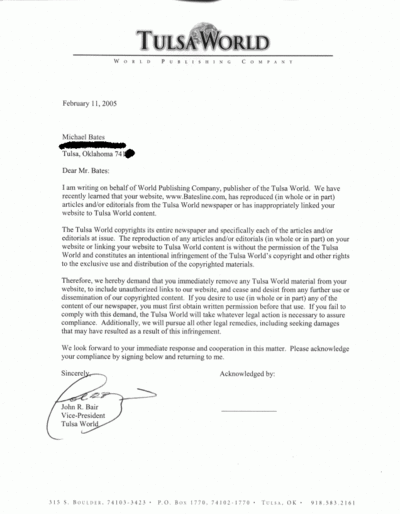Call me a Firefox fanboy
Danny Carlton is a good blogger. Politically, we're usually on the same page. I used to read his website on a regular basis.
Some time ago, he made the decision to block all Firefox users from his websites. If you're browsing in Firefox and click on one of his links, it sends you to whyfirefoxisblocked.com, where he explains that he's resorted to this because of a Firefox add-on called AdBlock Plus.
His feeling is that if you don't want to look at his ads, you shouldn't get to read his content. Fair enough. That's his right. Since he can't selectively detect and block AdBlock Plus users, he's blocking all Firefox users. He explains that it's no great loss, because there aren't that many Firefox users anyway, and they don't spend as much money as IE users. And he says that the Mozilla Corporation, which produces Firefox, is abetting theft by listing AdBlock Plus
It seems a bit excessive and counterproductive to block (and annoy) all his readers who use Firefox to screen out the handful that have installed AdBlock Plus. But that's his right.
The problem for him is that opinions are a dime a dozen. Danny is a good blogger, but he's hardly indispensable. If I can't read his site, I'll just spend that browsing time somewhere else. The typical reaction to being redirected to whyfirefoxisblocked.com won't be howls of outrage, but a shrug, followed by a click on the "Close Tab" X.
His most recent post is a swipe at "FireFox fanboys". Some of it is lashing out at people who have responded to his ban with profanity, denial of service attacks, and other reprehensible behavior, but some of it is aimed at ordinary Firefox users:
If you think the future of the internet is best decided by a committee of unelected computer-nerds (W3C), rather than the wishes and desires of billions of internet users (market forces)... ...you might be a FF Fanboy.
Blogger Don Singleton posted the first reply:
You are generally very level headed, but your war with FireFox users is tiring.
Danny responded with:
The Fanboys are only a segment of FF users. I'm not at war with FF users. I never was.
I tried to chime in with this comment:
What Don Singleton said. If you block all Firefox users, you're at war with all Firefox users.What percentage of your pageviews were coming from Firefox, and what percentage of your Firefox users were actually blocking your ads? And aren't there add-ons to IE that do the same thing as Firefox AdBlock Plus? Are you blocking them, too?
I have to use IE to pay a couple of bills every month. Other than that, if I can't get to it from Firefox, I don't bother going. (I made a special effort to read this post when it popped up on my Newsgator page.)
And yes, I'd rather have a neutral standards body define HTML than Microsoft. If that makes me a fanboy, so be it.
But when I hit post, this popped up:
Comments are disabled due to server drain. When the children finish their tantrums, comments will be enabled
I'll give him this much: Sitemeter had him averaging around 100 visits a day until his decision to block Firefox got the attention of Slashdot and other popular websites. He came close to 3000 visits a few days ago.
UPDATE: Danny's advertisers have another, bigger problem than Firefox. Our brains have their own built in Adblock, writes Jakob Nielsen (via a comment on an item on Guardian Unlimited):
The most prominent result from the new eyetracking studies is not actually new. We simply confirmed for the umpteenth time that banner blindness is real. Users almost never look at anything that looks like an advertisement, whether or not it's actually an ad.On hundreds of pages, users didn't fixate on ads. The following heatmaps show three examples that cover a range of user engagement with the content: quick scanning, partial reading, and thorough reading. Scanning is more common than reading, but users will sometimes dig into an article if they really care about it.
At all levels of user engagement, the finding is the same regarding banners (outlined with green boxes in the above illustration): almost no fixations within advertisements. If users are looking for a quick fact, they want to get done and aren't diverted by banners; and if users are engrossed in a story, they're not going to look away from the content.
[Click through to the article to see the heatmaps.]
The heatmaps also show how users don't fixate within design elements that resemble ads, even if they aren't ads (and thus aren't shown within green boxes above).
What does attract attention?
For example, we know that there are 3 design elements that are most effective at attracting eyeballs:
- Plain text
- Faces
- Cleavage and other "private" body parts
And the fourth way to get a reader to pay attention to an ad:
- The more an ad looks like a native site component, the more users will look at it.
- Not only should the ad look like the site's other design elements, it should appear to be part of the specific page section in which it's displayed.
But, writes Nielsen, that approach is unethical and likely to turn off readers in the long run if abused:
A specific ad may or may not be ethical, depending on how closely it masquerades as content. I caution against going too far, because it can backfire and mislead users. Unethical ads will get you more fixations, but ethical business practices will attract more loyal customers in the long run.
AND STILL MORE: Here's the Slashdot thread about Danny Carlton, courtesy Manasclerk.
More commentary on the matter from the folks who keep Oklahoma bloggers connected: Mike H. at Okiedoke and Kevin Latham, admin of the Blog Oklahoma webring. Kevin was annoyed enough to consider revoking Danny's membership in Blog Oklahoma, but decided to do nothing.




